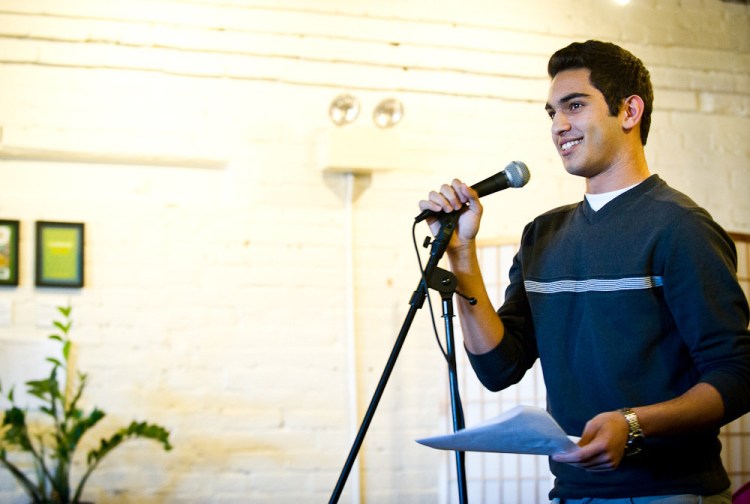Ibrahim Shkara knows he will be nervous when he meets first lady Michelle Obama at the White House on Tuesday, and he probably won’t have enough time to say much more than hello and thank you.
But if time allows, the 19-year-old senior from Deering High School in Portland will look Obama in the eyes, shake her hand firmly and speak with confidence. Even if it’s just hello, he will prepare his words thoughtfully and present them articulately, using the skills he has learned in The Telling Room’s youth development program, Young Writers & Leaders.
Obama will present The Telling Room with one of a dozen National Arts and Humanities Youth Program Awards in a White House ceremony. The award recognizes the program’s effectiveness in developing learning and life skills in young people by engaging them in the arts or humanities. It is considered a national model for assimilating migrant youths, and the White House award is the country’s highest honor for such programs.
“It’s a big thing,” Shkara said Wednesday afternoon, as he began preparing for his trip. “It’s a big thing to meet someone like her.”
The Telling Room is a Portland writing center that helps children and young adults develop their storytelling skills. By helping improving language skills, The Telling Room teaches students about self-confidence and self-expression. The Young Writers & Leaders program is a competitive after-school literary program for international multilingual high school students. Students apply to get in, and there’s always a waiting list. Its goal is to prepare students for future success by improving their writing and communication skills, and particularly their confidence. Among its other accomplishments, the program has a 100 percent college acceptance rate among participating students.
It serves about 45 high school students a year, and has been active for six years. It costs about $80,000 to run the program each year, said Heather Davis, the Telling Room’s executive director.
In addition to the White House recognition, The Telling Room will receive $10,000 to support the program.
Davis hopes the publicity translates into more funding and an expansion of the program to 100 students a year. “We want to bring it beyond Portland to other cities in Maine who want it,” she said. “It’s hard work, but to be honored in such a tremendous way is so powerful.”
The class meets every Thursday afternoon, and is designed to give a platform to students to tell their stories. Although the students come from diverse geographies and cultures, they share a common story of coming to the United States and settling in Maine. The class encourages them to write about their experiences, said Sonya Tomlinson, who helps teach the program.
Molly Haley, another instructor, said students are paired with writing mentors, who help them with their language skills. The Telling Room publishes the students’ stories in an annual anthology.
The program helped keep Emmanuel Muya, now 21, out of trouble. He came to the United States from the Republic of Congo in 2009. “It helped me get to know people from Maine and to make friends,” said Muya, who is studying at Southern Maine Community College.
It gave Edna Akimana, 19, the confidence to pursue a college career. She is studying biochemistry at the University of Southern Maine, and said she wouldn’t have thought about a challenging college career had she not learned how to be confident in herself and her abilities. She came to Maine from Burundi in 2013.
And it helped give Shkara the ability to express himself and tell his story about his journey from Iraq. He left Baghdad at age 8 and spent eight years in Cairo before coming to the United States in 2012.
“What I have learned from it is being a good communicator, sharing stories, standing in public and speaking about my culture and my home country,” he said.
Even if it’s only with a polite hello, Shkara will demonstrate those skills when he shakes the first lady’s hand Tuesday afternoon.
Send questions/comments to the editors.



